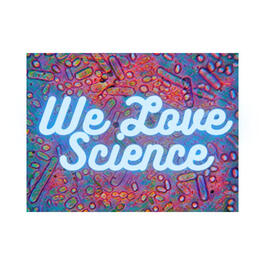
We Love Science
Celebrating the untold stories, the extraordinary discoveries, and the inspiring lives led by those whose jobs, passions, hobbies and more embody their love of science. Hear stories about -- the dedicated scientists who unravel the mysteries of biology; the artists and musicians who highlight the beauty of science through their craft; the educators, policy makers and science outreach advocates whose convictions propel them toward community engagement and preparing the next generation of STEM leaders; and the bona fide science enthusiasts who design their own unique journey to science fulfillment.
Show episodes
In the final episode of our Academia to Industry series, we sit down with Dr. Christine Vazquez, a viral immunologist and Principal Scientist at GSK, to explore what it really means to make science work for patients. With humor, warmth, and sharp insight, Christine walks us through her deeply personal journey—from the
Dr. LaTasha Fraser, program manager for the Science and Technology Entry Program (STEP) at New York University (NYU) joins us today to discuss her journey in science, the people who inspired her, and the lessons she learned along the way. She was motivated to go into science by a very unconventional source–the Maury Sh
Today we welcome Dr. LaTasha Fraser, program manager for the Science and Technology Entry Program (STEP) at New York University (NYU), which offers resources to middle school through graduate school students in numerous areas within STEM–engineering, math, medicine, and others.. The program works through a tiered syste
We are back today with Ariel Parker, Director of Partnerships and Legacy at the Center for Engineering MechanoBiology (CEMB) to learn about her career journey. As a child, her science spark was ignited by a combination of playing with a toy microscope, an inspirational physics teacher, and the board game Life. In high
Today, we are joined by Ariel Parker, Director of Partnerships and Legacy at the Center for Engineering MechanoBiology (CEMB)–a science and technology center funded by the National Science Foundation (NSF). The CEMB represents faculty across various disciplines at multiple institutions within mechanobiology, an interdi
Dr. Luis Martinez is back to speak with us about his journey. As a senior venture associate at Capital Factory, a venture capital firm, his love of science began by noticing what was missing–people doing science who looked like him. Luis was raised in an incredible town on the U.S.-Mexico border–El Paso, Tx. His introd